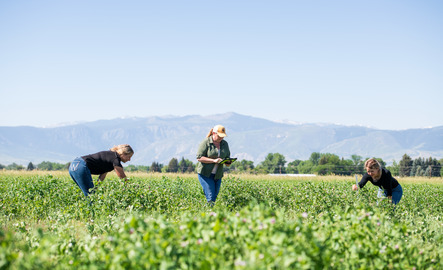About the Natural Resource Economics Minor
A minor in natural resource economics is a powerful addition to any undergraduate
degree. Why? You’ll add management and economic decision-making skills to your resume
in addition to learning how to allocate natural resources.
This minor consists of 21 credit hours, including four required courses and your choice
of three approved electives. Course topics range from water resource economics to
negotiation. Our wide variety of course offerings ensures you’ll graduate ready to
pursue an impactful career!
You must be enrolled in an undergraduate degree at the University of Wyoming to declare
a natural resource economics minor. Students can count courses for their primary degree
toward this minor.

Students are encouraged to join one of the many student-led clubs and organizations on campus. Doing so is a great way to meet like-minded peers, network with professionals and get involved in the local community. The College of Agriculture, Life Sciences and Natural Resources is home to more than 30 student clubs and organizations, including:
- American Farm Bureau Federation Young Farmers and Ranchers
- Wyoming Collegiate Cattle Association
- ACRES Student Farm
- UW Livestock Judging Team
- Gamma Sigma Delta (The International Honor Society of Agriculture)

What can you do with a minor in natural resource economics?
A minor in natural resource economics is the right choice for anyone seeking an agriculture or business-related career. Our graduates are prepared to analyze resource trade-offs, evaluate natural resource policies and make smart economic decisions.
A minor in natural resource economics can complement a variety of majors and open doors to careers that combine environmental awareness with economic insight. Here are some jobs where this background is especially useful:
- Environmental consultant
- Resource economist assistant
- Conservation analyst
- Sustainability coordinator
- Natural resource policy assistant
- Land use planner
- Environmental education specialist
- Agricultural or energy analyst
- Forestry or wildlife management support roles
- Nonprofit or government program coordinator
UW grads pursue fulfilling careers with a variety of employers in the natural resource sector. Here are some of the places they work:
- USDA Natural Resources Conservation Service
- Wyoming Game & Fish Department
- Wyoming Department of Environmental Quality
- U.S. Department of Housing and Urban Development
- Peace Corps
- U.S. Forest Service
Natural resource economics is the study of how we use, manage and conserve the Earth’s natural resources—like water, forests, minerals and energy—in a way that balances environmental sustainability with economic needs. It combines principles of economics with environmental science to explore how policies, markets and human behavior impact resource use over time. You'll learn to evaluate trade-offs, assess environmental costs and benefits and help design solutions that support both the economy and the planet.
A natural resource economist analyzes how we use and manage natural resources like water, energy and land to support both economic development and environmental sustainability. They collect and interpret data, evaluate the costs and benefits of policies, and advise governments, nonprofits or businesses on resource-related decisions. Their work helps shape smarter strategies for conservation, energy use and long-term environmental planning.
"The natural resource economics minor gives students the basic foundations to tackle some of today’s most pressing challenges—how we balance economic growth with environmental stewardship. Whether you're majoring in business, engineering or agricultural sciences, this minor adds valuable skills that employers are looking for."
- Ben Rashford, Department Head, Agricultural and Applied Economics


